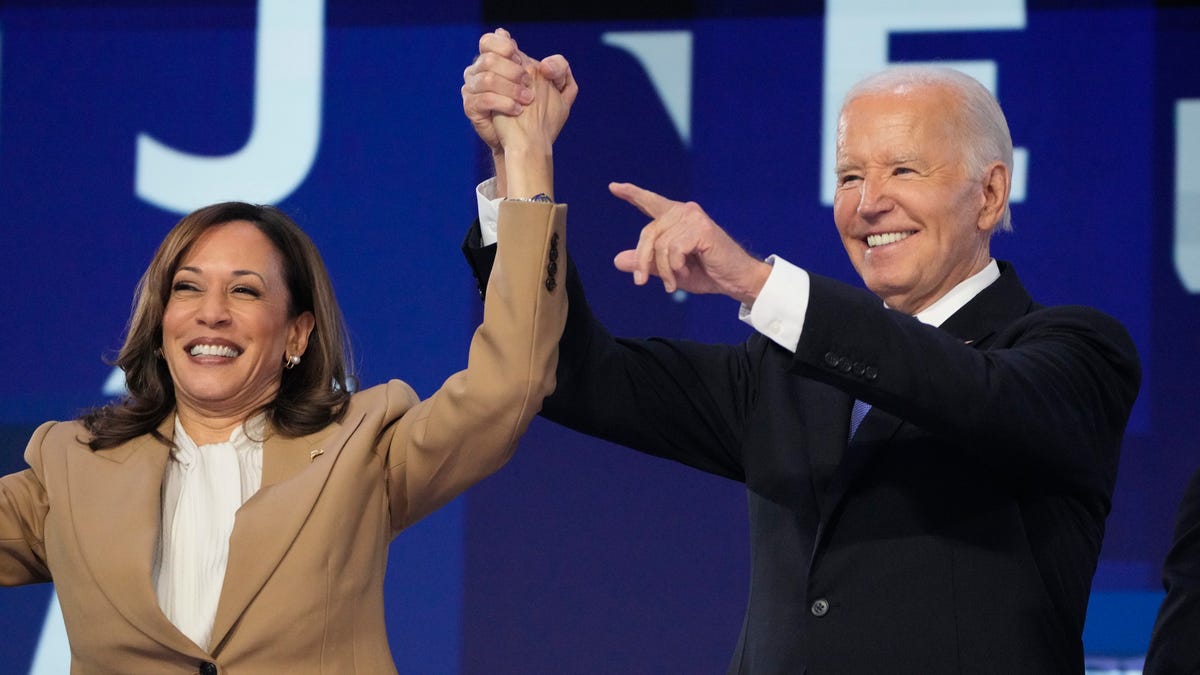Trump’s ‘Comrade Kamala’ jab is excessive, but price controls are truly a terrible idea
Kamala Harris might be trying to show she’s ‘taking action’ against grocery prices, but government intervention won’t solve the problem.
Former President Donald Trump is known for giving his rivals unflattering nicknames.
His current label for his Democratic rival in the presidential race is “Comrade Kamala Harris.”
Trump aims to depict the vice president as extremely leftist.
Harris’ latest economic outline, unveiled last Friday and lacking in factual support, further fuels this socialist image.
Her expansive government-driven agenda and expensive proposals have a lot of flaws.
One of the biggest issues is her suggestion to implement government price controls on businesses in the private sector. While Democrats often blame “greedy corporations” for the nation’s struggles, the truth is more complex. Increasing government intervention in the marketplace is likely to exacerbate issues for Americans.
Price controls have been attempted in various ways worldwide for many years. (Spoiler alert: they have always failed.)
Even Republican President Richard Nixon tried price controls in the 1970s to combat rising prices, ultimately only worsening inflation.
Will we never learn from the past?
Harris faces a ‘Bidenomics’ dilemma
What’s happening is that Harris is struggling to divert attention from the pain of rising inflation experienced during the Biden-Harris administration.
She’s also attempting to shift any accountability for this situation away from the administration.
Even though Democrats are trying to center this presidential election on disparaging Trump or promoting abortion rights nationwide, they cannot escape voter discomfort regarding the economy and inflation.
Unfortunately for Harris, she and Biden are responsible for the current economic climate. Their attempt to champion “Bidenomics” backfired once they noticed it wasn’t a wise strategy.
Inflation has surged since Biden and Harris took office. While some of this price increase was due to the aftermath of the COVID-19 pandemic, it’s undeniable that their policies and ongoing high spending have played a role in this issue.
Inflation has heavily impacted various sectors, but one thing everyone feels at the grocery store is the steep rise in food prices. Thus, Harris has chosen to address this by proposing a federal ban on “price gouging” in the food supply chain.
It’s worth noting that the inflation rate is currently decreasing, including in the food sector, primarily due to the Federal Reserve’s decision to increase interest rates, although the effects of higher prices will linger for a long time.
Reasons price controls are ineffective
Harris’ proposal for price controls lacks depth, making it beneficial to look at related legislation proposed by Democratic Senators Bob Casey from Pennsylvania and Elizabeth Warren from Massachusetts, which Harris has backed.
From 2019 to 2023, food prices indeed surged by 25%, outpacing other areas like housing and medical care, with transport seeing higher increases.
But did this price hike result from a malicious scheme by companies to exploit their customers? Absolutely not.
Even the Biden-Harris Department of Agriculture admits that many factors beyond corporate control, including disruptions from COVID-19 and the conflict in Ukraine, are to blame for these price increases.
While Harris may wish to present an image of “taking action,” government intervention is not the solution, and that’s precisely what price controls would entail.
“This will cause shortages,” stated Scott Lincicome, a senior fellow at the Cato Institute. “It will reduce investment in that sector, resulting in higher prices in the long run.”
“If businesses cannot expect reasonable returns on their investments or face bureaucratic hurdles dictating operations, they will invest less or possibly not at all in that industry,” Lincicome continued. “Over time, this leads to reduced supply, diminished competition, and worse outcomes for consumers. History demonstrates this repeatedly.”
President Biden has proposed his own price-capping strategy, supported by Harris, which includes a recent initiative to restrict how much landlords can raise rent.
However, like other price restrictions, rent controls can result in housing shortages and other related issues and have received criticism from many economists. A former top economic advisor for President Obama remarked to The Washington Post: “Rent control has faced significant disrepute as an economic strategy.”
The Free Market is Superior to Government Intervention
While Harris’s price-control plan might not resemble communism in a simplified form, it is still a misguided strategy, raising concerns that it was among her initial significant policy suggestions.
“You don’t have to call it communism,” Lincicome stated. “It’s simply poor economic policy.”
Policymakers will never accurately determine the ideal price; this responsibility is better suited for the free market. If you need proof, consider the situation in socialist countries like Venezuela, where government control leads to consistent food shortages.
Harris’s plan mirrors the ideology of central planners from the Soviet Union’s long-standing economy, as pointed out by First Trust economists Brian Wesbury and Robert Stein.
Though Harris might be aiming for catchy phrases, price controls can be perilous. They should be left in the repository of failed ideas.

